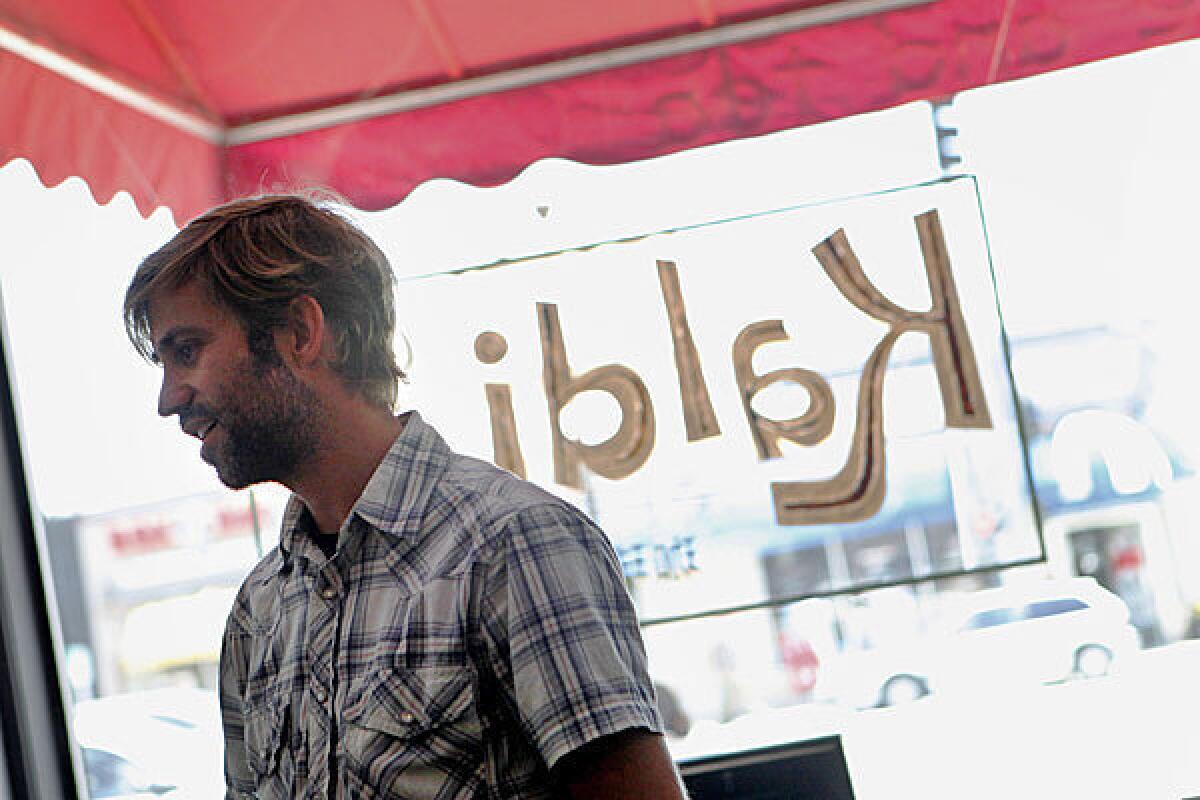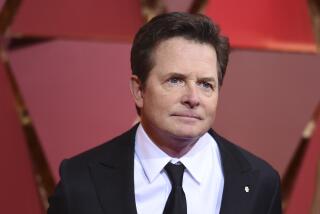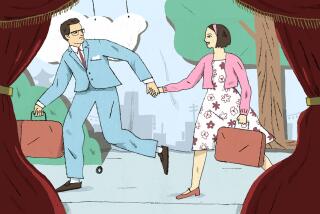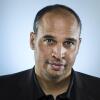An actor despairs in Tinseltown

Seth Burnham sat in a dim corner of Kaldi Coffee & Tea, clutching a mug as he tried to conjure some confidence.
Being here in L.A., I’m giving it everything, he thought.
But after three years of living in Los Angeles, he hadn’t had a single role he could be proud of. In a cable TV comedy, he played Percy the Carjacker, a dimwit blown to shreds by an air hose. For an independent film, he had been the best friend of a beautiful woman — a role the script called Small Gay Man.
FULL COVERAGE: Chasing the dream
Hollywood is one big lottery. You have to play it if you want a career in movies or TV....You have to be here. You have to believe.
Sometimes that was tough. Take STARmeter, the entertainment insider’s website that measures the popularity of Hollywood actors.
“I was No. 80,000,” Burnham said, “for a while.”
Frustrated and fatigued, he would retire to this worn, cave-like cafe in Atwater Village.
PHOTOS: Keeping his acting dream alive
He had found his surrogate Los Angeles family here, a group of a dozen or so who eased his loneliness and shared his Hollywood ambition: Amy, the animator who had worked on “South Park,” Nicholas, whose latest film was well received at the Sundance Film Festival, and Amad, a rising African American actor who worried about being typecast in criminal roles.
They stayed for hours, talking, typing, hunched hard over laptops, nursing lattes. They were actors, writers and directors; stragglers, success stories and hard-luck cases like Burnham.
Many days, he sat in a torn leather chair reading through newspapers and memorizing scripts. He seemed swallowed in the furniture — brown-haired, bearded, not much more than 5 feet tall, with worry lines marching from the corners of his eyes.
Time was against him. Asked his age back in February, Burnham paused. “Mid 30s-ish, early 40s-ish,” he said.
Outside of the cafe, he had few Los Angeles friends. His wife, a medical student, moved to St. Louis last year for a residency, but he stayed here. They decided that if she was going to devote herself fully to her dream, then he would too.
But how much more rejection could he handle? And was the unrelenting struggle worth more to him than his marriage?
::
Since his college days in the early 1990s, the acting quest had taken Burnham to several cities. He lived in San Francisco and London, where he trained at a drama school in the classical English style and started a theater company. He lived in Portland, Ore., and Seattle, where he got good reviews for his role in a modern adaptation of Chekhov’s “The Seagull.”
Everywhere he put down roots he found a place like Kaldi. “The anti-Starbucks,” he said. “Just my style.”
In Los Angeles, he developed a cafe routine. Each morning, he awoke in his cramped apartment, fed kibbles to his cats, threw on his sneakers and walked across Glendale Boulevard.
He drank two iced coffees a day, no more. He couldn’t afford more, not when he didn’t have a job — he had to be free for auditions. He relied on credit cards and his wife’s salary to pay his bills.
Burnham didn’t want fame; he wanted to simply be a journeyman, a working actor, appreciated for his skill, making roughly the same yearly salary as a union electrician.
He sat in the cafe for entire mornings and sometimes entire days. “Wrestling demons,” he said.
He worried that he wasn’t getting work because he was too intense. Maybe it was his looks. “Hell, I’m tiny,” he said.
Several of his front teeth were too small and a few others were spaced too far apart. “In L.A. I’m surrounded by working actors with these great, fake smiles,” he said. “It’s awful.”
There were other internal wars. His parents divorced about the time he got his first role as a child, singing in a play in his New Hampshire hometown. His father long ago told him to grow up and quit pursuing acting as a career. “It’s so easy to say that,” Burnham said. “Easy to criticize, doubt, say ‘give up’ and ‘I told you so.’ ... I’ve never been one for easy.”
The cafe regulars understood. Clay Tarver, who co-directed his first movie with J.J. Abrams, the creator of “Lost,” was the most successful; he wrote regularly for major film studios. Others occupied every struggling step of the Hollywood ladder.
“A lot of the people there are on a level I would like to be on,” Burnham said. “There is always, always, always some level of jealousy…. I try hard not to let it show.”
Instead, he tried to be helpful. Once, he sat at a table outside, helping Amad Jackson work on a British accent for his role in a Kirk Douglas Theater production of “A Raisin in the Sun.”
Jackson wanted to return the favor, but Burnham didn’t have anything to rehearse.
“Hollywood is no joke,” Jackson said. “It’ll deal some hard blows.... Almost everyone at Kaldi has been in Seth’s shoes at one time or another.”
By the end of March — a month in which he got a part in a public service announcement for PBS but didn’t get a role as a pimp for a movie called “Zombies vs. Strippers” — Burnham’s stress was showing. His shoulders slouched, his quiet voice was getting harder to hear above the din of Kaldi’s bustle. Only now the stress wasn’t due simply to the fact that he didn’t have much acting work.
Everyone at Kaldi could tell — and not just the Hollywood hopefuls. “Seth!” he would hear, walking through the glass front door in the mornings. It was Big Dave, the warm-hearted, bass-voiced barista who helped give the place its quirky feel.
Burnham would grin half-heartedly, then walk the 10 steps to the counter, where his iced coffee was already being made.
“How’s it going, Seth?”
“Oh, long story ... long story.”
::
His wife, Rebekah, didn’t visit Los Angeles often. Money was too tight and she was too busy.
They married while living in Seattle in 2004, and not long afterward moved to Portland and then San Francisco so she could go to medical school. He worked at a clothing store and auditioned for anything he could, but little panned out. For the Oscar-winning movie “Milk,” he could be seen walking down the streets of San Francisco. For Sean Penn’s “Into the Wild,” he was part of a graduation scene.
The roles only whetted his appetite. By 2009, he was ready to move to Los Angeles, a place he longed for and loathed. Hollywood dangled the possibility of steady acting jobs, real paychecks and a career. Hollywood also crushed the Seth Burnhams of the world.
“Even though there’s a part of me that just wants to live in a small town and spend my time tending a garden, I came,” he said.
Earlier this year, Burnham was picked for two parts in an independent play, “First Love/Worst Love.” His main role was that of a struggling New Englander distraught over a woman.
It mirrored his life. Rebekah wanted to fly to Los Angeles for the play but wasn’t sure she could make it. He needed to see her. He was beginning to realize that daily phone conversations were hardly a substitute for a real marriage.
On June 23, at the Open Fist Theatre Company in Hollywood, Burnham pushed his way through his last performance. None of the regulars made it.
More important was Rebekah. She wasn’t there. Maybe she sent flowers? No such luck.
“I want our life back,” he said after the play was done.
Not long afterward, over the phone, his wife said that she would always hope for his acting dreams, but she wanted a divorce.
Nothing good would come of the next few weeks. He lost weight, started drinking and chain-smoking, and spent hours curled up on his living room couch in the darkness. Rebekah was the one person he had always leaned on; he feared that his single-minded pursuit of acting had torn them apart.
This quest for an acting career.... My God, it has led me down the road to ruin.
Normally, going to Kaldi would help, but by September the cafe had also changed.
A new owner took over in July and gave the place a face-lift. Gone was the large awning and the hand-painted window sign. The pockmarked walls were covered with crisp, butter-colored paint. The old bookshelf and the rickety table that kept spoons and sugar had been tossed. Most of the baristas lost their jobs, even Big Dave.
The new Kaldi was welcomed by many of the dreamers. The look was cleaner and brighter, the coffee was just as good and the Internet was generally more reliable.
Burnham, however, was one of several regulars who felt Kaldi had lost its charm. For him, part of it had to do with Rebekah; they had gone to the cafe many times and the memories felt like a punch to the gut. He had also applied for a barista job and been turned down.
Now, he walked past Kaldi to a place he had always avoided: the Atwater Village Starbucks.
He sat there in the bright sun on a recent morning, holding a paper cup filled with steaming mocha. There had been seven auditions in the previous month; seven more rejections.
He wondered whether he should move to Portland or Minneapolis, aim for a new line of work, move on. But could he?
“Maybe I should stay here,” he said. “L.A., acting, you know, I still believe....”
More to Read
Start your day right
Sign up for Essential California for news, features and recommendations from the L.A. Times and beyond in your inbox six days a week.
You may occasionally receive promotional content from the Los Angeles Times.







